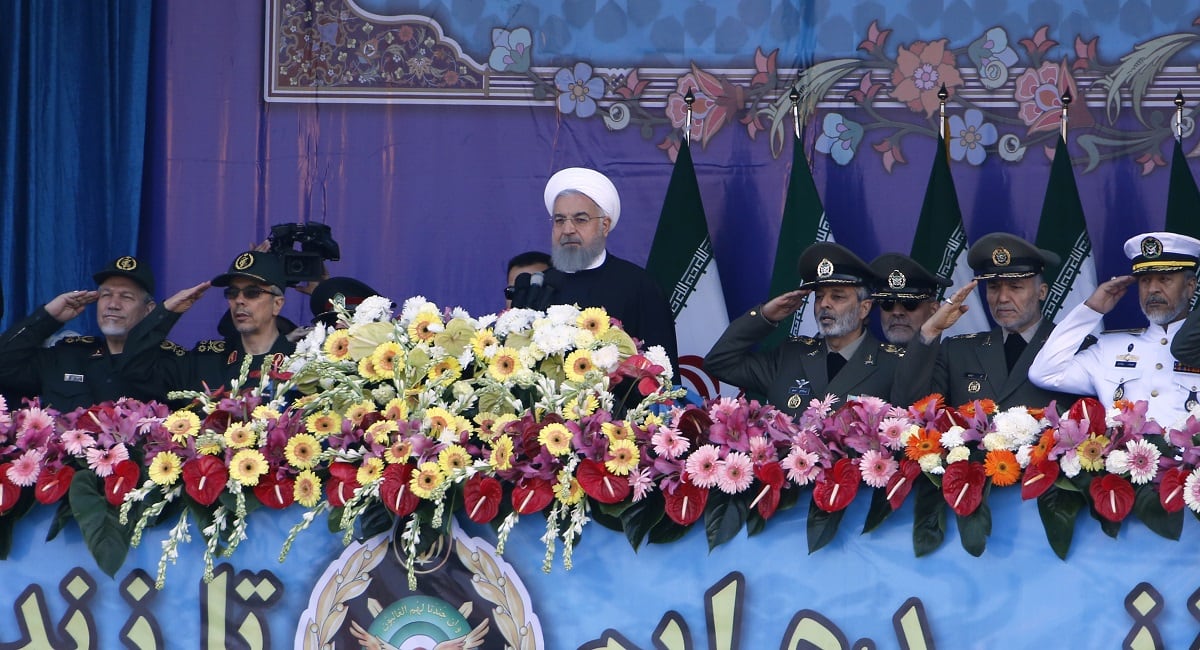U.S. President Donald Trump announced his intent to violate the landmark Joint Comprehensive Plan of Action, also known as the Iran deal, on Tuesday. In making a move that can be called short-sighted, irresponsible and highly politicized, the Trump administration has created a scenario wherein the United States and the global community are now less safe.
The majority of Americans and national security leaders support the deal. By most accounts — including the Trump administration’s Secretary of Defense Jim Mattis, Chairman of the Joint Chiefs of Staff Gen. Joseph Dunford, numerous U.S. intelligence agencies, the United Nations Security Council and Israeli Defense Forces Chief of Staff Lt. Gen. Gadi Eisenkot — the Iran deal is good and working.
Iran is not pursuing a nuclear weapon and does not have nuclear weapon capabilities. The International Atomic Energy Agency, also known as the United Nations’ nuclear watchdog, has vigilantly monitored Iranian nuclear activities and consistently certified Iran’s compliance with the terms of the JCPOA since 2015.
It’s difficult to think of any reason why this latest Trump administration decision is good for our national security and global interests. Perhaps 2017 Nobel Peace Prize recipient and ICAN Executive Director Beatrice Finh said it best by using language that Trump understands: “It’s an incredibly stupid decision, really.”
Here are five reasons why Finh’s succinct analysis is probably spot on:
Shirking leadership and shifting responsibility
The Trump administration is continuing its tendency to shirk global leadership and shift responsibility at every possible opportunity (see: the Paris climate accord, the Trans-Pacific Partnership). By failing to uphold the United States’ obligations under the multilateral Iran deal, Trump has shifted the burden of maintaining U.S. national security interests to our allies in the European Union. Iran analysts believe Iran will probably not do anything drastic — such as pull out of the Treaty on the Non-Proliferation of Nuclear Weapons, or NPT — but will instead look for ways to keep the terms of the JCPOA, provided the remaining signatories to the deal ensure that Trump’s withdrawal can be offset in other ways.
In other words, responsibility shifts to the European Union, along with China and Russia, to lead and compensate Iran for the adverse effects of Trump’s decision in order to ensure that Iran remains committed to the deal.
Destroying American credibility
By failing to uphold its end of a multilaterally negotiated agreement, the Trump administration is destroying American credibility. The administration has fractured the international unity that we need in order to hold Iran accountable in terms of nonproliferation and on other regional security matters.
Moreover, Iranians will never trust America again. The Watson Institute’s Narges Bajoghli conducted on-the-ground research of the Iranian Revolutionary Guard Corps, or IRGC, for nearly a decade. Her research previously revealed a shift in Iranian attitudes toward the West, as many IRGC members slowly but surely came to believe that the Iran deal “was the first important step toward broader ideological change.” Now, she writes, they mostly feel “embarrassment for having felt hopeful in the first place.”
The Trump administration’s short-sighted decision not only undermines the credibility of the United States, but also becomes the backdrop of the sensitive North Korea nuclear negotiations currently underway.
Endangering global nonproliferation efforts
Within 24 hours after Trump’s announcement, a Saudi minister stated that Saudi Arabia will pursue a nuclear weapon should Iran choose to restart its nuclear enrichment program, now that the Iran deal has been violated by the United States. As a signatory to the NPT, Saudi Arabia’s announcement is stunningly concerning, to say the least — as is the Trump administration’s failure to condemn such intent. Regarding this failure, the Arms Control Association’s Kelsey Davenport writes: “Washington cannot be seen as ambivalent, or worse, giving the green light to threats by any state to pursue nuclear weapons.”
Supporting global nuclear nonproliferation has long been a bipartisan stance of the United States government; if the Trump administration does not uphold this stance, they will truly undermine global nonproliferation efforts and put global security at risk.
Heightening regional tensions (in a region that needs no such help)
The Trump administration has long claimed to be a staunch supporter of Israeli security and vowed that it will bring peace to the Middle East. Yet, in the wake of this announcement, that promise seems to be more of a pipe dream than ever before. An hour after Trump announced U.S. withdrawal from the Iran deal, Israel reportedly attacked a military outpost in Syria, killing at least nine people, and is targeting other Iranian outposts in Syria, including an attack on Syria’s T4 air base in Homs province that killed seven Iranian military personnel. Note to the Trump administration: “Bringing peace” to the Middle East means ratcheting tensions down, not up.
RELATED

Putting the U.S. on the path to war
If pulling out of the Iran deal is part of a Trump administration effort to orchestrate war with the United States, we cannot and will not fall for it. Between U.S. Ambassador to the United Nations Nikki Haley’s presentation that fell significantly short on providing evidence back in February and Israeli Prime Minister Benjamin Netanyahu’s theatrical nothingburger performance last week, the Trump administration’s methods mirror those of President George W. Bush and Vice President Dick Cheney’s methods in the lead-up to the Iraq War. And as former Bush official Lawrence Wilkerson recently said: “If we’re not careful, they’ll succeed.”
In summation, this short-sighted decision could have disastrous implications for our national security interests, our standing in the global community and our long-term credibility. We are risking the security of our Israeli allies and putting the United States on a warmongering path where it is not warranted or wanted by the American people. It is an all-around bad decision.
Sherry Hakimi is a security fellow with the Truman National Security Project. The views expressed here are her own.








